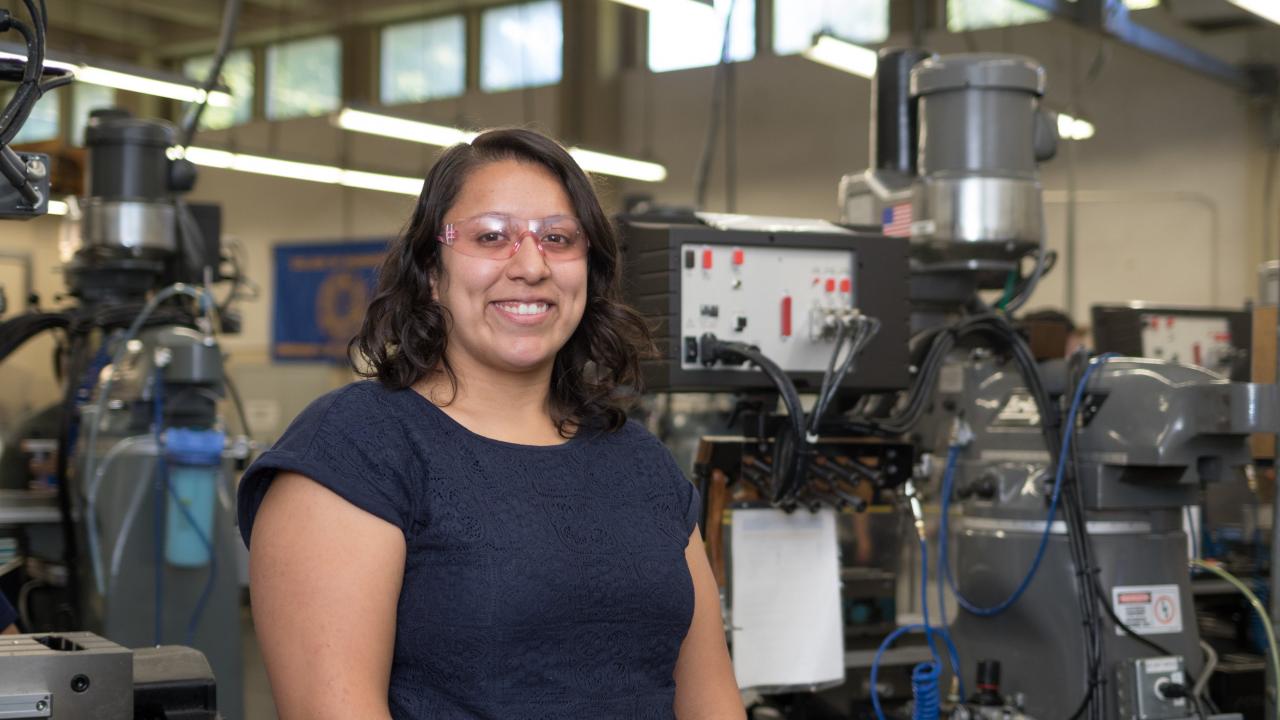
Destined for success
By Aditi Risbud Bartl
Originally posted by the UC Davis College of Engineering.
Destiny cannot be contained. After a decade in the College of Engineering, Destiny Garcia is now mere months away from earning her Ph.D. in mechanical and aerospace engineering. An energetic and warm young woman, she is finally taking a moment to reflect on her experiences at UC Davis.
Raised in Fairfield, California as one of seven children, Garcia saw the UC Davis water tower as a beacon of opportunity on car rides back and forth to visit family in Sacramento. Garcia’s counselor, Latoya Thompson, encouraged her to attend field trips to UC Davis through junior high and high school.
“I had a pretty rough childhood. I was in foster care, then we got back with our parents. I had a dysfunctional family with a family member in and out of jail. There was always something going on,” Garcia says. “When I was a senior in high school, I felt like I had years on all the other kids in my class. I was like, ‘I’m going to go to college. I’m going to go do something with my life.’”
When she was accepted to the College of Engineering, Thompson connected her with the campus’ STEP Program, which strives to enhance the academic and social experiences of first generation and low-income students during their first two years of college. This program provided Garcia with a four-week academic “boot camp” in math, writing, physics and chemistry before fall quarter started, and Garcia quickly embraced the myriad resources available to her in engineering.
“Before I even started my first quarter, I met everyone in the engineering dean’s office. With (LEADR program director) Tanya Whitlow and (graduate coordinator) Alin Wakefield, I knew I could go to them even if I wasn’t in trouble,” Garcia says. “I basically already had a network, and I knew I needed it to be successful. I thought I could do it by myself, but it would be really hard, so let me do it with a whole village with me.”
Even with her village cheering her on, Garcia struggled through her first year as a biomedical engineering major, taking concurrent pre-calculus, pre-chemistry and co-physics classes at the Academic Assistance and Tutoring Centers to build a mathematical and physical foundation for success in her “real” classes. Garcia expanded and grew her village with math, writing, physics and chemistry specialists that have continued to provide her support.
“College was this journey of learning that you’ve got to figure it out. So, I figured out that it was all about networking and knowing the ‘re’ in resources means again and ‘source’ is something that you can take from again and again and again,” Garcia says.
One of these resources was biomedical engineering undergraduate advisor Rosalind Christian, who guided Garcia to pursue mechanical engineering when her passion for manufacturing surfaced during a summer research project.
“Being in the Engineering Student Design Center and making things, cutting metal, having grease on my hands, I couldn’t even explain these feelings,” Garcia says. “I was just shining and glowing, and I was like, ‘This is cool. I really like manufacturing.’”
Building on her enthusiasm, Garcia approached her instructor about pursuing research in her area of interest and secured a spot in the McNair Scholars Program, a federal program funded by the U.S. Department of Education and designed to prepare undergraduate students for doctoral studies through involvement in research. Garcia conducted in research in advanced manufacturing, working on a wire electrical discharge machine to generate a titanium-based biocompatible material for medical devices.
“Through undergraduate research, I got exposed to conferences, and realized there were thousands of other people also doing research. Like, oh my God, everyone’s just researching and presenting. And then it just became this normal thing that I did too. At the Annual Statewide Undergraduate CAMP Symposium, I received the Special Merit Award for physical sciences research. And I used that as a sign to apply for grad school.”
Now, as a graduate student working with mechanical and aerospace engineering professor Barbara Linke, Garcia relishes opportunities to engage with undergraduates and hopes to soon be a lecturing faculty member at a research university. Through an NSF teaching fellowship, she was able to teach science to sixth graders and received training and tools to prepare for a career in teaching. Garcia is also a UC Davis Professors for the Future Fellow, a year-long competitive fellowship program designed to recognize and develop the leadership skills of outstanding graduate students and postdoctoral scholars who have demonstrated their commitment to professionalism, integrity and academic service.
“I just love explaining things to someone. If you can explain something to a sixth grader and they’re able to actually understand what you’re talking about and keep up, you can teach anybody,” Garcia says. “And being able to teach students, especially undergrads who are trying to figure themselves out? That’s what I want to do.”
